
Senate Unveils Mental Health ABC Act 2.0: Addressing Barriers to Care
Bill works in tandem with landmark investments in mental and behavioral health
to transform mental health care delivery
Today (11/09/2021), the Massachusetts Senate unveiled its Mental Health ABC Act 2.0: Addressing Barriers to Care (ABC) (S2572), comprehensive legislation to continue the process of reforming the way mental health care is delivered in Massachusetts, with the goal of ensuring that people get the mental health care they need when they need it. This legislation comes at a time when the Massachusetts State Senate is making landmark investments in mental and behavioral health, including $400 million in American Rescue Plan Act (ARPA) funds to transform the behavioral health sector, with $122 million dedicated to recruiting and retaining nearly 2,000 behavioral professionals.
The Mental Health ABC Act 2.0 is driven by the recognition that mental health is as important as physical health for every resident of the Commonwealth and should be treated as such. The bill proposes a wide variety of reforms to ensure equitable access to mental health care and remove barriers to care by supporting the behavioral health workforce.
"This important bill will put policies place to ensure that people get the mental health care they need, when they need it and provide a national model for how we can create an integrated and comprehensive health care system that treats mental health the same as physical health," stated Senate President Karen E. Spilka (D-Ashland). "Out of the darkest days of the COVID-19 pandemic, there is reason for hope, because we are no longer talking about the need for quality mental and behavioral health care in whispers, shamed by stigma. As we all face the emotional difficulties and social isolation of the pandemic, people across our Commonwealth are talking about their struggles with mental health, and the call for quality mental health care is now a roar. I'd like to thank Senators Cyr, Friedman and Rodrigues for their hard work and collaboration on this bill, and the many advocates, individuals and families who have fought for changes to our mental health care delivery system and who have never given up."
"Too many people in Massachusetts struggle to access the mental health services they desperately need and deserve," said Senator Julian Cyr (D-Truro), co-chair of the Joint Committee on Mental Health, Substance Use and Recovery. "The Mental Health ABC Act 2.0 is an important step towards realizing the Senate's vision to transform how the Commonwealth addresses mental health. I am deeply grateful to Senate President Karen Spilka for her leadership and example, and to Senators Friedman and Rodrigues for their partnership in this most urgent endeavor."
"For far too long, mental health has been a forgotten component of our healthcare system despite our statutory parity mandate that calls for equitable coverage between medical and surgical treatment and mental health treatment," said Senator Cindy F. Friedman (D-Arlington), co-chair of the Joint Committee on Health Care Financing. "This bill serves as a first step forward in addressing the persisting inequities in our delivery of mental health services that keep patients from accessing the care they need, and will provide a framework for the state to better enforce our mental health parity laws. I want to thank Senate President Spilka, Chair Rodrigues, and Senator Cyr for their thoughtful collaboration on this initiative and shared commitment to reforming our mental health care system so it is accessible, affordable, and equitable for all."
"The Mental Health ABC Act 2.0 is a landmark step toward making sure people can get the mental health care they need when they need it," said Michael J. Rodrigues (D-Westport), Chair of the Senate Committee on Ways and Means. "The Senate's targeted investments in mental health in the ARPA bill and the FY22 budget have made it clear that cost of action on this issue is far less than the cost of inaction, for the sake of all residents of the Commonwealth. I applaud Senate President Spilka for her compassionate and steadfast leadership on this issue, and Senators Cyr and Friedman for their diligent work to build upon last session's ABC Act and put forward a comprehensive bill that will ensure equitable access to mental health care for all."
Additions to the original version of the Mental Health ABC Act contained in this legislation include: guaranteeing an annual mental health wellness exam at no cost to the patient; creating an online portal that enables access to real-time data to move patients from emergency to appropriate care; establishing a complex case resolution panel to help resolve barriers to care for children with complex behavioral health needs who find themselves in the emergency room; requiring the Office of the Child Advocate and the Health Policy Commission to issue reports on child emergency department boarding; creating a standard release form; expanding access to psychiatric care by requiring the state-contracted and commercial health plans to cover mental health and substance use disorder benefits offered through the psychiatric collaborative care model; incentivizing investments in acute psychiatric services; and establishing an Office of Behavioral Health Promotion.
The following is an overview of The Mental Health ABC Act 2.0.
Ensuring Equitable Access to Mental Health Care
Guaranteeing Annual Mental Health Wellness Exams. The idea that a person's mental health is just as important as a person's physical health is the cornerstone of this reform. This bill would codify this principle by mandating coverage for an annual mental health wellness exam, comparable to an annual physical.
Enforcing Mental Health Parity Laws. Mental health parity as a concept is simple: insurance coverage for mental health care should be equal to insurance coverage for any other medical condition. This concept has been codified in federal and state law for decades, but enforcement of the law has been challenging. As a result, inequities persist, and patients are often denied coverage for mental health treatment that is every bit as critical to managing their health as treatment for diabetes or heart disease.
This bill provides the state with better tools to implement and enforce our parity laws by creating a clear structure for the Division of Insurance to receive and investigate parity complaints to ensure their timely resolution. Other tools include parity enforcement for commercial, state-contracted and student health insurance plans, greater reporting and oversight of insurance carriers' mental health care coverage processes and policies, and reasonable penalties and alternative remedies for when an insurance company does not comply with the law.
Addressing the Emergency Department Boarding Crisis. For many adults and children in the grips of a mental health crisis, the fastest way to get help is to go to a hospital emergency department (ED). Sadly, when they need to be admitted to an inpatient psychiatric unit, it can be days, weeks, or even months before they're admitted. Meanwhile, the person must often wait in the ED, receiving little to no psychiatric care. This is referred to as 'ED boarding' and it has increased up to 400% since the COVID-19 pandemic began.
Given the severity and urgency of the state's ED boarding crisis, this bill tackles the issue in several ways, by:
- Creating an ARPA-funded online portal that enables access to real-time data on and includes a search function that allows health care providers to easily search and find open beds using a number of criteria;
- Establishing a complex case resolution panel to help resolve barriers to care for children with complex behavioral health needs and would include representatives from several state and local health and education agencies working together to ensure a child's behavioral health needs are met in a timely manner;
- Requiring all hospital EDs to have a qualified behavioral health clinician available to evaluate and stabilize a person admitted to a hospital ED with a behavioral health presentation during all operating hours;
- Directing the Office of the Child Advocate (OCA) to produce an annual report on child ED boarding; and
- Tasking the Health Policy Commission (HPC) with conducting a statewide pediatric behavioral health assessment every five years to inform future policymaking.
Addressing ED boarding will help families experiencing acute mental health crises receive timely care.
Reimbursing Mental Health Providers Equitably. Mental health and primary care providers are reimbursed at different rates for the same service. The bill seeks to level the playing field for reimbursement to mental health providers by requiring an equitable rate floor for evaluation and management services that is consistent with primary care.
Reforming Medical Necessity and Prior Authorization Requirements. When an adult or child arrives in an emergency department in the throes of acute mental health crises requiring immediate treatment in an appropriate setting, clinical determinations should be made by the treating clinician. In practice, however, insurance carriers impose too many restrictions on providers' clinical judgement in terms of prior approval and concurrent review requirements for mental health services.
This results in barriers to, and delays in, treatment for patients who need immediate care, creating a dysfunctional system that allows insurance companies to have more leverage in determining a patient's course of treatment than health care providers.
This bill mandates coverage and eliminates prior authorization for mental health acute treatment and stabilization services for adults and children; requires MassHealth and commercial insurance companies to follow a uniform set of criteria established by the American Society of Addiction Medicine (ASAM) for medical necessity and utilization management determinations for treatments for substance use disorder (SUD); and ensures that if a health insurance company intends to change its medical necessity guidelines, the new guidelines must be easily accessible by consumers on the health insurance company's website.
This bill also establishes a special commission to bring all stakeholders to the table to study and make recommendations on the creation of a common set of medical necessity criteria to be used by health care providers and insurance carriers for mental health services.
Creating a Standard Release Form. Behavioral health providers struggle in the era of electronic health records and care coordination to create systems that simultaneously protect an individual's right to consent to share sensitive health information and allow practitioners to access the information they need to treat the individual and coordinate care. This bill would direct the development of a standard release form for exchanging confidential mental health and substance use disorder information to facilitate access to treatment by patients with multiple health care providers.
Increasing Access to Emergency Service Programs. Emergency Service Programs (ESPs), which are community-based and recovery-oriented programs that provide behavioral health crisis assessment, intervention, and stabilization services for people with psychiatric illness, are currently covered by MassHealth. The bill would require commercial insurance companies to cover ESPs as well.
Expanding Access to the Evidence-Based Collaborative Care Model. The collaborative care model delivers mental health care in primary care through a team of health care professionals, including the primary care provider, a behavioral health care manager, and a consulting psychiatrist. This evidence-based access to mental health care has proven effective, less costly, and less stigmatizing. The bill would expand access to psychiatric care by requiring the state-contracted and commercial health plans to cover mental health and substance use disorder benefits offered through the psychiatric collaborative care model.
Reviewing the Role of Behavioral Health Managers. Some insurance companies have subcontracted mental health benefits to specialty utilization management companies for years with mixed results. The bill directs the Health Policy Commission, in consultation with the Division of Insurance, to study and provide updated data on the use of contracted mental health benefit managers by insurance carriers, often referred to as "carve-outs."
Incentivizing Investment in Acute Psychiatric Services. This bill would create an exemption from the Department of Public Health's determination of need process to incentivize health care facilities to invest in and develop more acute psychiatric services across the Commonwealth, including inpatient, community-based acute treatment, intensive community-based treatment, a continuing care unit and partial hospitalization programs.
Tracking and Analyzing Behavioral Health Expenditures. This bill includes a critical first steps toward incentivizing greater investments in mental health care within the analysis of statewide health care cost growth. Specifically, the bill directs the Center for Health Information and Analysis (CHIA) to define and collect data on the delivery of mental health services to establish a baseline of current spending; and directs the Health Policy Commission (HPC) to begin tracking mental health care expenditures as part of its annual cost trends hearings.
Establishing an Office of Behavioral Health Promotion. Current behavioral health services are spread across state agencies. This dilutes the responsibility for mental health promotion and focus on the issues and undermines the important work being done. This bill would establish an Office of Behavioral Health Promotion within the Executive Office of Health and Human Services (EOHHS) to coordinate all state initiatives that promote mental, emotional, and behavioral health and wellness for residents.
Increasing Access to Care in Geographically Isolated Areas. This bill would direct the Department of Mental Health (DMH) to consider factors that may present barriers to care—such as travel distance and access to transportation—when contracting for services in geographically isolated and rural communities.
Removing Barriers to Care by Supporting the Behavioral Health Workforce
Creating a Roadmap on Access to Culturally Competent Care. This initiative builds off an academic study mandated and funded through the Commonwealth's Fiscal Year 2021 budget to review the availability of and barriers to accessing culturally competent mental health care providers. Under this provision, an interagency health equity team under the Office of Health Equity, working with an advisory council, would make annual recommendations for the next three years to improve access to, and the quality of, culturally competent mental health services. Paired with the Senate's ARPA investment of $122 million in the behavioral health workforce through loan repayment assistance programs, this roadmap will make great strides toward building a robust workforce reflective of communities' needs.
Allows for an Interim Licensure for Licensed Mental Health Counselors. The bill would create an interim licensure level for Licensed Mental Health Counselors (LMHCs) so that they can be reimbursed by insurance for their services and be eligible for state and federal grant and loan forgiveness programs, further increasing the number of licensed providers able to serve patients.
Expanding Mental Health Billing. This bill would allow clinicians practicing under the supervision of a licensed professional and working towards independent licensure to practice in a clinic setting. This will help to ensure quality training and supervision and encourage clinicians to stay practicing in community-based settings.
Updating the Board of Registration of Social Workers. The bill would update the membership of the Board of Registration of Social Workers to clarify that designees from the Department of Children and Families (DCF) and Department of Public Health (DPH) be licensed social workers.
This legislation builds upon the original Mental Health ABC Act, passed by the Senate in 2020, important provisions of which have been signed into law, including:
- Standardizing credentialing forms, which shortens the amount of time it takes for newly hired mental and behavioral health professionals to be approved for inclusion in an insurance network, increasing access to care.
- Requiring coverage for same day care, removing a significant financial barrier to the integration of primary care and mental health.
- Creating a tele-behavioral health pilot program, which authorized three pilots for tele-behavioral health services in public high schools in the Commonwealth.
- Creating a psychiatric mental health nurse practitioner fellowship pilot program, which offers additional support and training to psychiatric nurse practitioners who agree to work in community settings with underserved populations.
- Creating a mental health workforce pipeline to encourage and support individuals from diverse backgrounds to choose careers in mental health by emphasizing that it is valued and important work.
- Studying access to culturally competent care to review the availability of culturally competent mental health care providers, as well as to identify potential barriers to care for underserved cultural, ethnic and linguistic populations, the LGBTQ+ community, and others.
This legislation also comes at a time when the Massachusetts State Senate is making transformative investments in mental and behavioral health, including:
- $400 million in American Rescue Plan Act (ARPA) funds to transform the behavioral health sector, with $122 million dedicated to recruiting and retaining nearly 2,000 behavioral professionals.
- $10 million annually for the newly-created Behavioral Health Outreach, Access and Support Trust Fund, which funded the highly successful More to the Story public awareness campaign.
- $10 million for the rapid creation of new inpatient mental health acute care beds, particularly new beds for children, adolescents and underserved communities.
- $15 million for Programs of Assertive Community Treatment (PACT) for children who exhibit symptoms of serious emotional disturbance; PACT uses a multidisciplinary team approach to provide acute and long term supports for individuals in the community.
- $3 million for a loan repayment assistance program to recruit and retain child and adolescent psychiatrists at community mental health and health centers.
The Senate is scheduled to debate the Mental Health ABC 2.0 Act next week.
CommonWealth Magazine coverage of the legislation released for discussion
Boston Globe coverage of proposal https://www.bostonglobe.com/2021/11/09/metro/mass-senators-unveil-wide-ranging-mental-health-measure/



